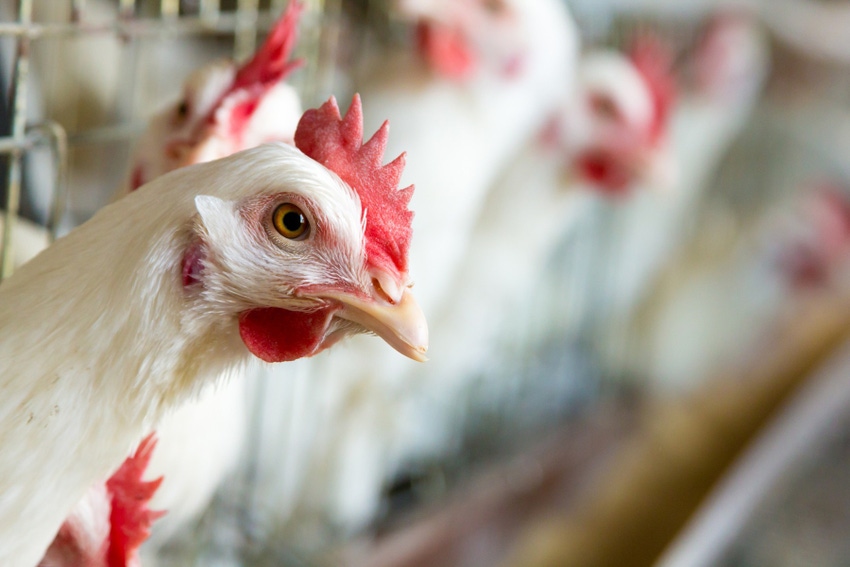Study shows turkeys more susceptible than broilers; virus causes enteric symptoms in birds but not death.
January 15, 2020

The first animal study of the potential for porcine deltacoronavirus to jump to another species shows that the virus, once introduced to a select group of birds, is easily transmitted to healthy chickens and turkeys, according to an announcement from The Ohio State University.
The researchers who led this work were part of a team that previously found in a laboratory setting that the virus could infect cells from multiple species, including chickens and humans.
In the new study, birds that were given the virus developed diarrhea by two days after infection. Healthy birds housed with infected chickens and turkeys also developed diarrhea two days after exposure, the announcement said.
That rapid spread of disease surprised the Ohio State scientists.
“We weren’t even sure the virus would transmit from bird to bird. That’s a significant finding,” said senior author Scott Kenney, assistant professor of veterinary preventive medicine based in Ohio State’s Food Animal Health Research Program at the Ohio Agricultural Research & Development Center in Wooster, Ohio.
“It looks like it’s pretty readily able to spread between birds. It’s a little concerning, because if the virus gets into one or two animals in a large layer or broiler house, it would probably permeate through the entire house pretty quickly,” Kenney said.
The study was published in the online journal Emerging Infectious Diseases.
Porcine deltacoronavirus was first detected in pigs in Asia in 2009 and caused a swine diarrhea outbreak in the U.S. — involving pigs in Ohio — in 2014. It is part of the family of pathogens that cause respiratory and gastrointestinal diseases in the species they infect.
There are four types of coronaviruses. Two illnesses known for life-threatening regional outbreaks — severe acute respiratory syndrome and Middle East respiratory syndrome — were caused by betacoronaviruses. Deltacoronaviruses historically have been linked to birds, and scientists suspect that this porcine virus originated in an avian species, Ohio State said.
In this study, researchers worked with 14-day-old chickens and turkeys. In each group, they directly gave 10 birds the virus obtained from an infected pig. Two days later, the researchers allowed uninfected “sentinel” chickens and turkeys to live among the infected birds.
Most infected birds developed diarrhea at various time points, and the sentinels had mild to moderate diarrhea after joining the infected flock. Based on the length and severity of symptoms, the study showed that turkeys are more susceptible to the virus than chickens, Ohio State said.
Other signs of disease in the birds included distended intestinal tracts containing gas and yellow liquid, high levels of the virus RNA in swabs of their tracheas and digestive tracts and increased antibody levels in the directly infected birds and some sentinels, said Patricia Boley, first author of the study and a research associate in Kenney’s lab.
“Both chickens and turkeys were still shedding the virus at 14 days, when the study ended. We don’t know how long either species would continue shedding the virus,” Boley said.
Despite the presence of viral RNA in the trachea, the birds showed no signs of respiratory symptoms, which would make this virus more dangerous than enteric/intestinal symptoms. While the virus did not kill the birds, it can lead to death in piglets.
“We want to figure out why the virus is enteric versus respiratory and how the hosts respond differently,” Kenney said. “With piglets, we see mortality. We don’t have chickens dying, but we have piglets dying from the virus, so what makes the chickens different in their response to the virus? Maybe we can learn something from chickens and apply it to the pigs so they get less sick from the virus.”
While there is no screening in place to detect this deltacoronavirus in humans, Kenney said it is feasible that humans have been exposed and infected and even had symptoms.
“People who get gastroenteritis may write it off as food poisoning. Deltacoronaviruses may be, in some cases, causing human disease, but we don’t know that aspect of it yet,” he said.
The virus cannot be transmitted to people via consumption if the meat is properly cooked, he noted.
This work was supported by National Institute of Food & Agriculture funding to the Food Animal Health Research Program.
Ohio State co-authors Moyasar Alhamo, Geoffrey Lossie, Kush Kumar Yadav, Marcia Vasquez-Lee and Linda Saif also worked on the study.
You May Also Like

.png?width=300&auto=webp&quality=80&disable=upscale)

